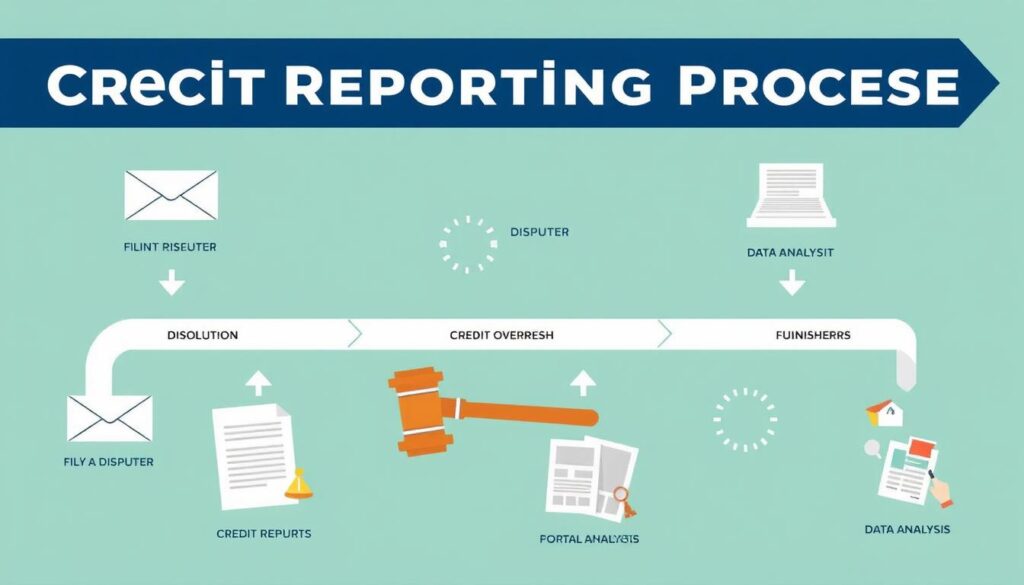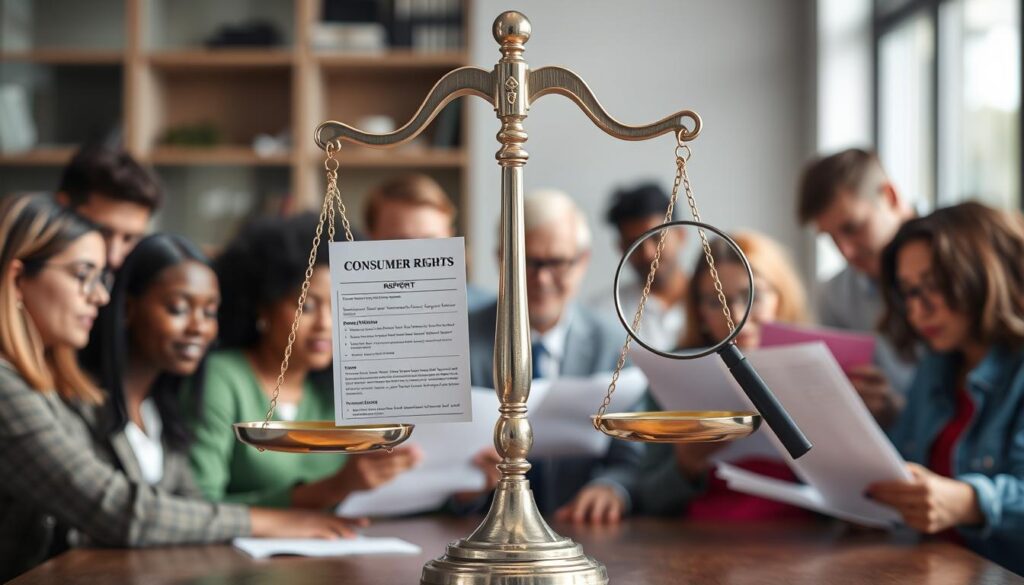Credit report disputes can be challenging. However, they’re vital for maintaining accurate financial records. The Fair Credit Reporting Act (FCRA) allows you to contest wrong information on your credit reports.
Knowing where to send your disputes is crucial. This guide will help you identify major credit agencies and prepare effective dispute letters. You’ll learn how to navigate the process and protect your rights.
By the end, you’ll be ready to take charge of your credit report. This knowledge will help safeguard your financial future.
Key Takeaways
- The Fair Credit Reporting Act (FCRA) grants consumers the right to dispute inaccurate or incomplete information on their credit reports.
- Identifying the correct credit bureau addresses for submitting disputes is crucial for ensuring your concerns are addressed promptly.
- Preparing a well-structured dispute letter with supporting documentation increases the likelihood of a favorable resolution.
- Understanding the credit reporting dispute process, including timelines and legal remedies, can help you effectively exercise your rights under the FCRA.
- Proactively monitoring your credit report and addressing any discrepancies can help maintain the accuracy and integrity of your financial history.
Understanding the Fair Credit Reporting Act (FCRA)
The Fair Credit Reporting Act (FCRA) oversees consumer credit information handling. It grants consumers specific rights, including disputing inaccurate credit report entries. Knowing your FCRA rights is vital for a healthy credit profile.
Overview of Consumer Rights under the FCRA
Under the FCRA, consumers have several key rights. These include free yearly access to credit reports from major bureaus.
Consumers can dispute incorrect information and have it removed. They’re informed when credit report data affects decisions about them.
Additionally, consumers can opt out of pre-screened credit and insurance offers.
Importance of Disputing Inaccurate Credit Report Entries
Incorrect credit report info can lead to credit, loan, or job denials. By disputing inaccurate credit report entries, you protect your financial future.
Addressing errors ensures a fair and accurate credit profile. It’s a crucial step in maintaining your financial health.
“Regularly reviewing your credit report and promptly disputing any errors is essential for protecting your financial wellbeing.”
Identifying the Major Credit Reporting Agencies
Equifax, Experian, and TransUnion are the three major credit reporting agencies in the United States. These agencies gather and store consumer credit data. Lenders and employers use this info to assess creditworthiness.
Equifax, Experian, and TransUnion Contact Information
Having the right contact details for each credit bureau is key. This ensures your credit report disputes are handled well. Here are the addresses for submitting disputes:
- Equifax: Equifax Information Services LLC, P.O. Box 740256, Atlanta, GA 30374-0256
- Experian: Experian, P.O. Box 4500, Allen, TX 75013
- TransUnion: TransUnion Consumer Solutions, P.O. Box 2000, Chester, PA 19016-2000
These addresses are only for credit report disputes. For other matters, you may need different contact info. Be sure to use the right address for your needs.
“Knowing the contact information for these credit bureaus is essential when submitting a credit report dispute.”
Knowing these contact details helps you submit disputes correctly. This ensures your concerns are addressed quickly. Proper handling of disputes helps keep your credit history accurate.
Preparing Your Credit Report Dispute Letter
Crafting a strong credit report dispute letter is key to fixing errors on your credit report. Your letter should pinpoint disputed items and include proof. Ask the credit bureau to look into and fix the mistakes.
Essential Components of an Effective Dispute Letter
Your credit report dispute letter should have these important parts:
- Identification Information: Clearly state your full name, current address, and other personal details to help the credit bureau identify your credit report accurately.
- Specific Dispute Items: Identify the specific credit report entries you are disputing, such as account numbers, dates, and the nature of the inaccuracy.
- Explanation of Inaccuracies: Provide a clear explanation of why the disputed information is inaccurate or incomplete, referencing any supporting documentation you have.
- Request for Investigation: Explicitly request that the credit bureau investigate the disputed items and provide you with the results of their investigation.
- Copies of Supporting Documentation: Gather and include copies of any documents that support your dispute, such as payment records, account statements, or correspondence with creditors.
Include all needed info in your letter to boost your chances of success. This will help you fix errors on your credit report. Your letter can make a big difference in resolving issues.
“Accurate credit reports are essential for maintaining a healthy financial profile. Taking the time to file credit report disputes can make a significant difference in your overall credit health.”
| Key Element | Importance |
|---|---|
| Identification Information | Ensures the credit bureau can accurately locate and address your credit report |
| Specific Dispute Items | Helps the credit bureau focus on the specific inaccuracies you want investigated |
| Explanation of Inaccuracies | Provides a clear rationale for why the disputed information is incorrect |
| Request for Investigation | Clearly communicates your expectation for the credit bureau to investigate and resolve the dispute |
| Supporting Documentation | Strengthens your dispute by providing tangible evidence of the inaccuracies |
fcra credit bureau disputes address
The FCRA credit bureau disputes address is vital for challenging credit report errors. It’s the starting point for disputing inaccuracies under the Fair Credit Reporting Act (FCRA). Knowing the right address ensures your dispute is handled properly.
Each major credit bureau has its own mailing address for disputes. Sending your letter to the correct address is crucial. This ensures timely and efficient processing of your dispute.
- Equifax: P.O. Box 740256, Atlanta, GA 30374-0256
- Experian: P.O. Box 4500, Allen, TX 75013
- TransUnion: P.O. Box 2000, Chester, PA 19016
Using the right fcra credit bureau disputes address is essential. Sending to the wrong address may cause delays or failure to process. Double-check the address before mailing your dispute letter.

Remember, the FCRA gives you the right to dispute any inaccurate or incomplete information on your credit report. Taking action and utilizing the correct fcra credit bureau disputes address is an important step in safeguarding your financial well-being.
Gathering Supporting Documentation
When disputing errors on your credit report, gather relevant supporting documents. This includes copies of bills, statements, or records showing the mistakes. Strong evidence boosts your chances of winning credit report dispute letters.
Here are key types of supporting documentation to collect:
- Copies of bills or statements that show the correct information, contradicting what’s listed on your credit report
- Receipts, canceled checks, or bank statements that prove you made payments on time or that a debt has been paid off
- Correspondence with the creditor or furnisher, such as letters or emails, that demonstrate the inaccuracy of the credit report entries
- Proof of identity, such as a driver’s license or passport, to verify that the information on your credit report belongs to you
Including these documents with your credit report dispute letters strengthens your case. It gives credit bureaus more reason to investigate and fix errors.
This approach helps resolve dispute inaccurate credit report entries more efficiently. Your disputes are more likely to succeed with solid proof.
| Type of Supporting Documentation | Purpose |
|---|---|
| Copies of bills or statements | Demonstrate the correct information that contradicts what’s on your credit report |
| Receipts, canceled checks, or bank statements | Prove you made payments on time or that a debt has been paid off |
| Correspondence with the creditor or furnisher | Demonstrate the inaccuracy of the credit report entries |
| Proof of identity | Verify that the information on your credit report belongs to you |
“Gathering and including supporting documentation is a crucial step in the credit report dispute process. It strengthens your case and increases the likelihood of a successful resolution.”
Submitting Your Dispute to the Credit Bureaus
You’ve prepared your credit report dispute letter and gathered supporting documents. Now it’s time to submit your dispute to the credit bureaus. Use certified mail with return receipt requested for proper processing.
Recommended Methods for Sending Disputes
Choose the right delivery method when filing credit report disputes. This creates a paper trail and confirms receipt of your complaint. Follow these steps to submit your dispute effectively:
- Obtain the mailing addresses for the credit bureaus you need to contact. These can be found on their respective websites or through the file credit report disputes process.
- Prepare your dispute letter and gather all relevant documentation, such as copies of your credit report and any evidence supporting your case.
- Send your dispute package via certified mail with return receipt requested. This will provide you with a delivery confirmation and a record of the date your dispute was received by the credit bureau.
- Keep a copy of your dispute letter and any supporting materials for your own records. This will be important for credit reporting dispute process tracking and follow-up if needed.
Certified mail creates a paper trail showing when the credit bureau received your dispute. This evidence can be crucial if you need to escalate your case later.

“The best way to ensure your credit report dispute is processed correctly is to send it via certified mail with return receipt requested.”
The credit reporting dispute process takes time, so be patient. Follow up if you don’t get a response within the required timeframe.
Stay organized and keep detailed records. This will help you successfully resolve any inaccuracies on your credit report.
Following Up on Your Credit Report Dispute
After submitting your credit report dispute, the real work begins. It’s vital to follow up and ensure credit bureaus investigate thoroughly. Make sure they’ve made the necessary corrections.
The Fair Credit Reporting Act (FCRA) sets a timeframe for credit bureaus. They must complete investigations within 30 to 45 days. Your diligence is key during this process.
- Closely monitor the status of your dispute by contacting the credit bureaus regularly.
- Request written confirmation of the investigation’s completion and the actions taken.
- Review the updated credit report carefully to verify that the disputed items have been corrected or removed.
If credit bureaus don’t resolve your dispute satisfactorily, you have options. You can exercise your rights under the FCRA. This might include filing a complaint or seeking legal help.
| Action | Timeframe |
|---|---|
| Credit bureaus must complete investigation | 30-45 days |
| Credit bureaus must provide results | 5 days after investigation |
| Credit bureaus must correct any inaccuracies | 30 days |
The credit reporting dispute process is crucial for maintaining an accurate credit report. Stay active in following up. Exercise your rights under the FCRA. This ensures prompt handling of errors.
Handling Disputes with Creditors and Furnishers
Sometimes, you may need to dispute inaccurate information directly with the creditor or furnisher. These entities provide information to credit bureaus. Understanding their responsibilities can help you navigate the credit reporting dispute process effectively.
Knowing your rights under the Fair Credit Reporting Act (FCRA) is crucial. It empowers you to exercise your rights under the FCRA and address credit reporting issues.
The Role of Creditors and Furnishers
Creditors and furnishers must ensure accurate and complete reporting to credit bureaus. They’re required to investigate disputes and correct inaccuracies promptly. Failing to do so can violate the FCRA, potentially leading to legal action.
- Creditors must investigate disputed information and report results to credit bureaus.
- Furnishers need to verify the accuracy of information they provide to credit bureaus.
- Both must respond quickly to disputes and provide supporting documentation.
Understanding these roles helps you effectively dispute inaccurate credit report entries. It allows you to hold creditors and furnishers accountable for their reporting.

“Knowledge is power, and understanding your rights under the FCRA can empower you to take control of your credit report and financial future.”
Credit Reporting Dispute Process Timelines
The Fair Credit Reporting Act (FCRA) sets specific timelines for the credit reporting dispute process. Knowing these timelines helps protect your rights under the FCRA. It ensures your dispute is handled quickly.
Credit bureaus must investigate and respond to disputes within 30 days. This can extend to 45 days if you provide extra information. They must correct errors in this timeframe.
After fixing errors, the bureau gives you a free updated credit report. If they find no errors, they must explain why in writing.
Understanding these timelines helps you hold credit bureaus accountable. It also helps maintain the accuracy of your credit information. You can ensure your dispute is handled properly.
If you face issues during the credit reporting dispute process, you may have legal options. The FCRA protects your rights. Consider talking to a consumer rights attorney to protect your finances.
Exercising Your Rights under the FCRA
The Fair Credit Reporting Act (FCRA) gives consumers various rights and legal remedies. These help address violations by credit bureaus or furnishers. Learning about these rights can protect your credit and financial health.
Legal Remedies for Violations of the FCRA
If credit bureaus or furnishers break FCRA rules, you can seek legal action. Here are some key options available to you:
- Filing a lawsuit against the credit bureau or furnisher for negligent or willful noncompliance with the FCRA.
- Recovering actual damages, such as lost wages or out-of-pocket expenses, resulting from the FCRA violation.
- Seeking punitive damages, which are intended to punish the offending party and deter future violations.
- Recovering your attorney’s fees and court costs if you prevail in the lawsuit.
To use your FCRA rights, know the rules for disputing credit report errors. Understand timelines for addressing violations by furnishers and credit bureaus.
Take action using the fair credit reporting act to protect your credit. This can help safeguard your financial well-being.

“The FCRA provides powerful tools for consumers to dispute inaccurate information and hold credit bureaus and furnishers accountable. Understanding and exercising these rights is essential for maintaining a healthy credit profile.”
| Legal Remedy | Description |
|---|---|
| Lawsuit against credit bureau or furnisher | You can file a lawsuit for negligent or willful noncompliance with the FCRA. |
| Actual damages | You can recover actual damages, such as lost wages or out-of-pocket expenses, resulting from the FCRA violation. |
| Punitive damages | You can seek punitive damages to punish the offending party and deter future violations. |
| Attorney’s fees and court costs | If you prevail in the lawsuit, you can recover your attorney’s fees and court costs. |
Conclusion
Understanding FCRA credit bureau disputes is crucial for a healthy credit profile. You can challenge inaccurate entries and improve your access to credit opportunities. By exercising your rights, you can correct errors on your credit report.
Submit dispute letters to Equifax, Experian, and TransUnion to regain control of your credit history. Gather supporting documents and follow up on your disputes for the best results.
Your credit report reflects your financial responsibility. Take proactive steps to protect it. Address inaccuracies promptly to build a strong credit foundation for your future.

